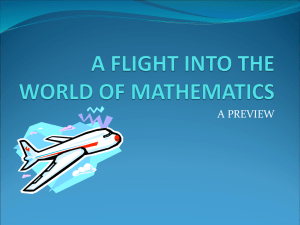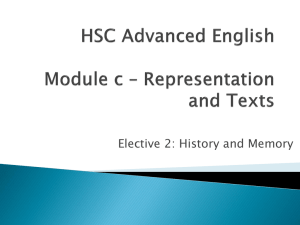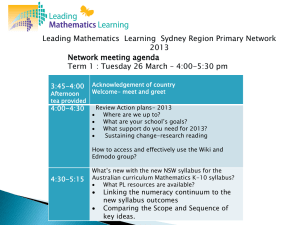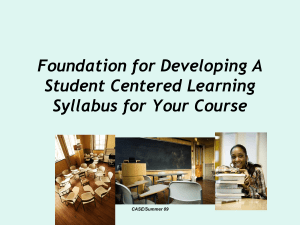Oct - Central Texas College
advertisement
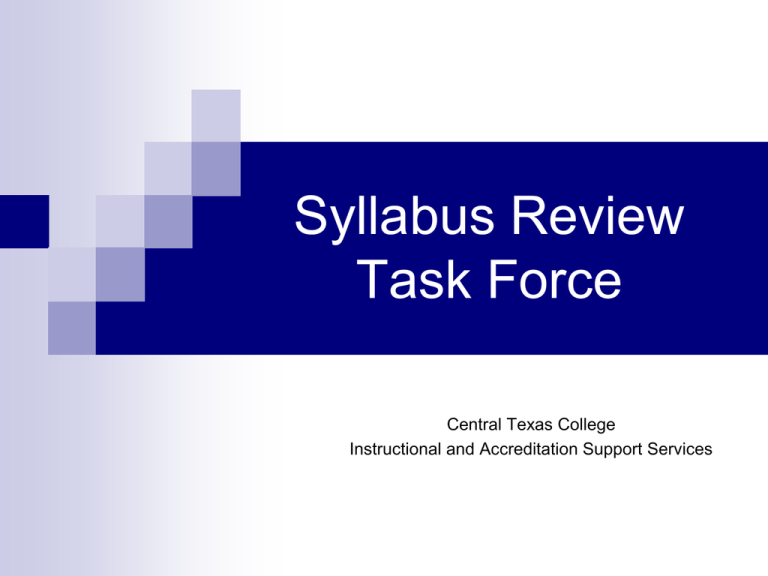
Syllabus Review Task Force Central Texas College Instructional and Accreditation Support Services Organization Chart Chancellor Deputy Chancellor/Dean Educational Program and Support Services Director Distance Education and Education Technology Director Institutional Effectiveness Dean Director Student Services Instructional Services Dean Library Services Michelle Anderson Lesley McGough Stephanie Durham (IM) (Fac Qual) (Sec) Director Learning Outcomes Assessment Syllabus Review Basics Informal structure Come and go Participation voluntary Rotate location Meeting no longer than 60-90 minutes 12 to 18 months project length Committee Task Force A body of persons delegated to consider, investigate, take action on, or report on some matter A temporary grouping for the purpose of accomplishing a definite objective vs. Chairman The presiding officer of a meeting, organization, committee, or event Facilitator vs. One that helps to bring about an outcome by providing indirect or unobtrusive assistance, guidance, or supervision Solution • an action or process of solving a problem • an answer to a problem specifically: a set of values of the variables that satisfies an equation • an act or the process by which a solid, liquid, or gaseous substance is homogeneously mixed with a liquid or sometimes a gas or solid • a homogeneous mixture formed by this process; especially: a singlephase liquid system • the condition of being dissolved • a bringing or coming to an end or into a state of discontinuity Trade-offs • a balancing of factors all of which are not attainable at the same time • a giving up of one thing in return for another Task Force Charge 1. Define Master Syllabus 2. Define Class/Course Syllabus 3. Address possible revision a) What is needed? b) What is not needed? c) How can we improve? 4. Electronic capabilities 5. Learning outcomes http://www.ctcd.edu/ia/index.htm http://www.ctcd.edu/ia/syllabus_review.htm Resources Web Pages Phone Email Instructional Services: X 1154 erin.rhoden@ctcd.edu http://www.ctcd.edu/ia/index.htm Syllabus Review Task Force: http://www.ctcd.edu/ia/syllabus_review.htm Stage One Define Master Syllabus Master Syllabus • What is it? • Why is it? • Who uses it? • How is it different from a class syllabus? Master Syllabus What is it? What is it? • Contract between faculty member and student • Resource for newly hired adjunct faculty members • Tool to disseminate administrative policies • Marketing tool provide preview of course content highlight new course offerings Master Syllabus • What is it? • Why is it? Why is it? • Describes the course • Defines the purpose/reason for the course • Establishes the course within the broader program of study • Communicates expectations • Provides consistency Master Syllabus • What is it? • Why is it? • Who Uses it? Syllabus Users • Faculty/Adjunct • Student • Other institutions (transfer) • Administration • Regulatory Agencies THECB/SACS HB 2504 Master Syllabus • What is it? • Why is it? • Who uses it? • How is it different from a class syllabus?

